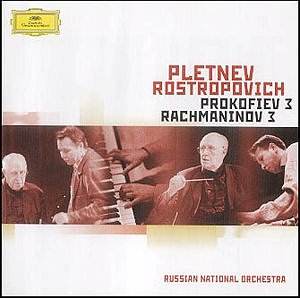Sometimes
the yellow beast of DG gives a hyperbolic roar of self-promotion
before it hurls its latest creation onto the shelves, ultimately
causing mere ripples in the musical world. In the relative absence
of such attention-seeking cries, I find myself looking in surprise
at the magisterial waves created by these eminent Russian musicians
with wonderful performances of two popular concertos. Originally
advertised on the DG website as pairing the Tchaikovsky 1st
piano concerto with Rachmaninov’s third, somewhere along the line
the Tchaikovsky was replaced by Prokofiev’s third, perhaps to
avoid doubling repertoire recently released by Lang Lang (DG 474
291-2).
When
one is used to hearing soloists pulling all the strings in these
pieces, it is refreshing to hear an orchestra playing with such
involvement, as equal rather than submissive partners. I recall
one particular passage in the first movement of the Rachmaninov
about one minute before the cadenza (Pletnev opts for the larger
of the two), where violins cheep from one speaker to the other
producing an eerie atmosphere, expertly captured by the sound
engineers. The whimsical dialogue between Pletnev and the orchestra
he founded reflects the pianist’s intimate knowledge of the score,
presumably gained from his experience conducting these pieces,
and he is instinctively aware when to command centre-stage and
when to play second fiddle. And even though we may be spoilt customers
for the Rachmaninov (according to one enthusiastic collector of
the ‘Rach 3’, there are almost two hundred commercially available
recordings), this performance deserves to be placed ahead of,
or at least equal with, any other modern recordings of the piece.
It may not have the immediate appeal of, e.g. Volodos/Levine (SK64384)
or Goerner/Sinaisky (VEL 3051), but listen to it imagining yourself
sitting right there inside the concert hall, and you should find
an extra dimension of music-making that can be too readily and
easily overlooked.
The
Prokofiev generates excitement not through sparkling tempi and
quicksilver fingers (cf Argerich/Abbado DG 447438-2), but through
a motoric sense of rhythm, underlined by chiselled staccatos and
finely-controlled dynamics. The trademark variety of tone that
Pletnev conjures from the keyboard is such that there are occasions
where it becomes difficult to tell where the piano ends and orchestra
begins. However, as a result of keeping the tempo and volume in
the third movement on a tight leash, perhaps they can be criticised
for failing to build up enough angular momentum to launch the
final flourish heavenwards. Much of the enjoyment to be gained
here, then, is in listening to the thoughtful craft with which
these artists approach this piece rather than the final product
they produce.
Altogether,
this is an outstanding release.
Michael
McMillan
